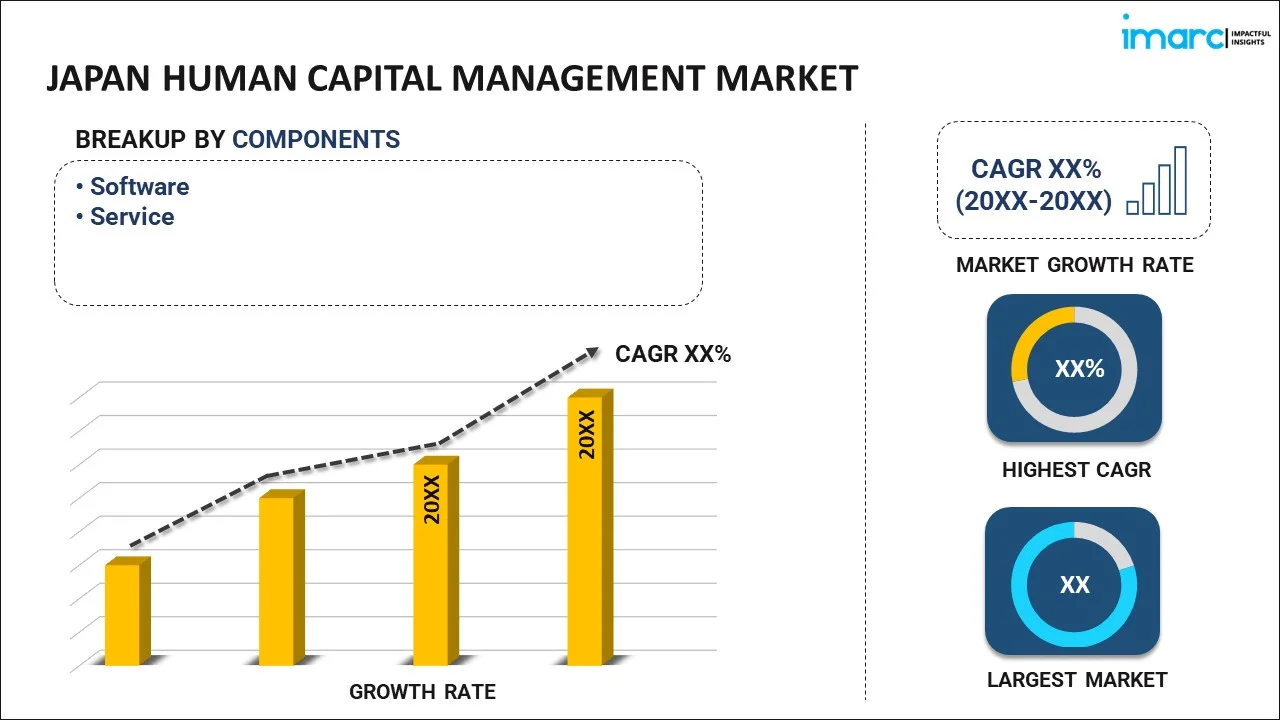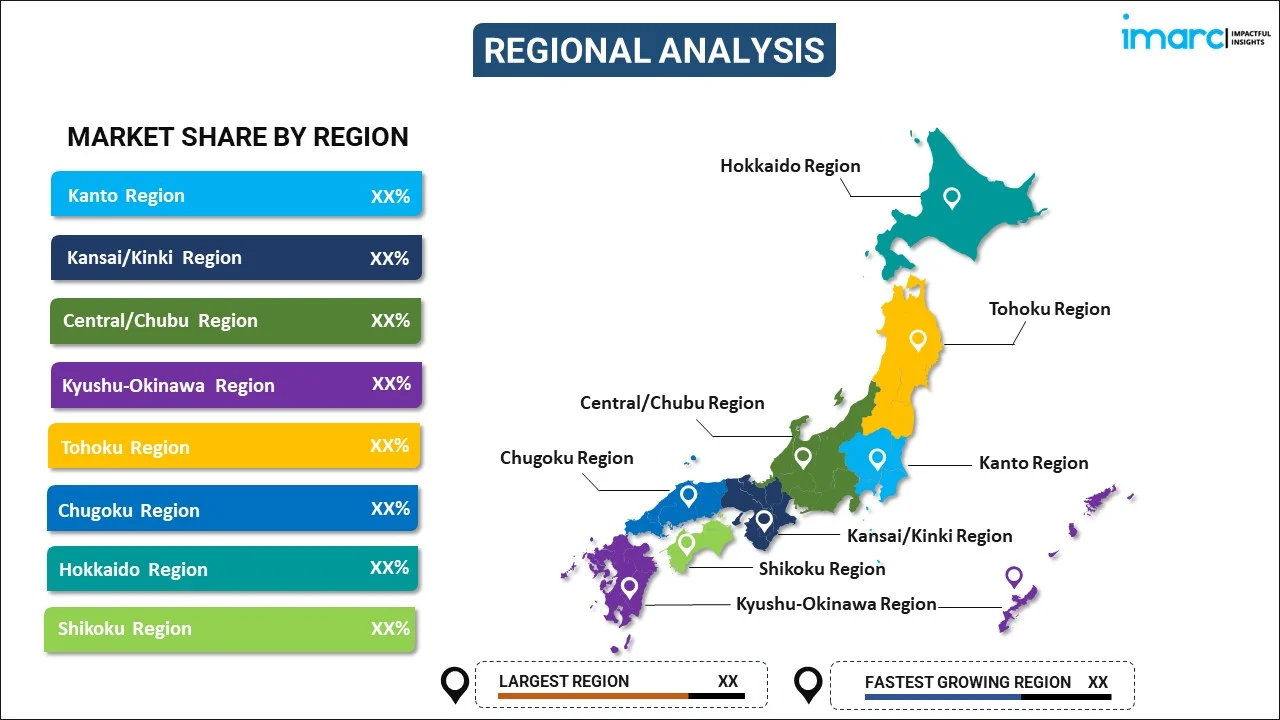
Japan Human Capital Management Market Report by Component (Software, Service), Deployment Type (Cloud-based, On-premises), Industry Vertical (BFSI, Retail, IT and Telecommunication, Healthcare, Hospitality, Government, Manufacturing, and Others), and Region 2026-2034
Market Overview:
Japan human capital management market size reached USD 1,677.1 Million in 2025. Looking forward, IMARC Group expects the market to reach USD 2,995.6 Million by 2034, exhibiting a growth rate (CAGR) of 6.66% during 2026-2034. The increasing reliance of businesses on data analytics to make strategic HR decisions, rising number of women, foreign nationals, and generations entering the job market, and widespread adoption of remote and hybrid work models represent some of the key factors driving the market.
|
Report Attribute
|
Key Statistics
|
|---|---|
|
Base Year
|
2025 |
|
Forecast Years
|
2026-2034
|
|
Historical Years
|
2020-2025
|
| Market Size in 2025 | USD 1,677.1 Million |
| Market Forecast in 2034 | USD 2,995.6 Million |
| Market Growth Rate (2026-2034) | 6.66% |
Access the full market insights report Request Sample
Human capital management (HCM) refers to the strategic approach that organizations take to manage and optimize their workforce. It involves the acquisition, development, and management of people to achieve organizational goals effectively. It encompasses various human resource (HR) functions, including recruitment, training, performance management, and employee engagement. It can lead to higher employee productivity and performance. It helps in retaining talented individuals by providing growth opportunities and recognition. It reduces the need for manual data entry and paperwork, allowing HR professionals to focus on strategic initiatives. It incorporates robust security measures to safeguard data against breaches and unauthorized access, ensuring compliance with data protection regulations. It aids in identifying and recruiting the right talent, followed by effective onboarding processes. It supports employee skill development through training and continuous learning initiatives. It can accommodate multiple languages, currencies, and legal requirements, making it easier to standardize HR processes across borders. Besides this, as it enhances employee morale, job satisfaction, and overall engagement, the demand for HCM is increasing in Japan.
Japan Human Capital Management Market Trends:
The increasing reliance of businesses on data analytics to make strategic HR decisions represents one of the key factors favoring the market growth in Japan. Additionally, the widespread adoption of remote and hybrid work models in Japan is strengthening the growth of the market. HCM platforms are offering advanced analytics and reporting tools to help organizations gain insights into workforce performance, turnover rates, and employee engagement. Along with this, the increasing aging population and the shrinking workforce in the country are offering a favorable market outlook. HCM systems are helping organizations address these challenges by optimizing workforce planning, upskilling existing employees, and improving talent retention strategies. Apart from this, businesses in Japan are seeking HCM solutions that can be customized to their specific needs and integrated with other HR and enterprise resource planning (ERP) systems seamlessly, which is encouraging vendors to offer flexible, modular HCM platforms. Furthermore, several companies are increasingly focusing on environmental, social and governance (ESG) initiatives, including diversity and inclusion efforts, which is offering a favorable market outlook in the country. HCM systems are widely utilized to track and report on ESG metrics, aligning HR practices with broader sustainability goals. Moreover, rapid digital transformation across different industry verticals is propelling the market growth in Japan. HCM software and solutions aid in helping companies adapt to this digital shift by streamlining HR processes, automating administrative tasks, and improving data analytics for informed decision-making. Besides this, the increasing number of women, foreign nationals, and generations entering the job market is influencing the market positively. HCM solutions are helping organizations effectively manage this diversity by offering tools for inclusive recruitment, talent development, and cultural integration in Japan.
Japan Human Capital Management Market Segmentation:
IMARC Group provides an analysis of the key trends in each segment of the market, along with forecasts at the country level for 2026-2034. Our report has categorized the market based on component, deployment type, and industry vertical.
Component Insights:

To get detailed segment analysis of this market Request Sample
- Software
- Core HR
- Recruiting
- Workforce Management
- Compensation and Payroll
- Others
- Service
- Managed Service
- Professional
The report has provided a detailed breakup and analysis of the market based on the component. This includes software (core HR, recruiting, workforce management, compensation and payroll, and others) and service (managed service and professional).
Deployment Type Insights:
- Cloud-based
- On-premises
A detailed breakup and analysis of the market based on the deployment type have also been provided in the report. This includes cloud-based and on-premises.
Industry Vertical Insights:
- BFSI
- Retail
- IT and Telecommunication
- Healthcare
- Hospitality
- Government
- Manufacturing
- Others
The report has provided a detailed breakup and analysis of the market based on the industry vertical. This includes BFSI, retail, IT and telecommunication, healthcare, hospitality, government, manufacturing, and others.
Regional Insights:

To get detailed regional analysis of this market Request Sample
- Kanto Region
- Kansai/Kinki Region
- Central/ Chubu Region
- Kyushu-Okinawa Region
- Tohoku Region
- Chugoku Region
- Hokkaido Region
- Shikoku Region
The report has also provided a comprehensive analysis of all the major regional markets, which include Kanto Region, Kansai/Kinki Region, Central/ Chubu Region, Kyushu-Okinawa Region, Tohoku Region, Chugoku Region, Hokkaido Region, and Shikoku Region.
Competitive Landscape:
The market research report has also provided a comprehensive analysis of the competitive landscape. Competitive analysis such as market structure, key player positioning, top winning strategies, competitive dashboard, and company evaluation quadrant has been covered in the report. Also, detailed profiles of all major companies have been provided.
Japan Human Capital Management Market Report Coverage:
| Report Features | Details |
|---|---|
| Base Year of the Analysis | 2025 |
| Historical Period | 2020-2025 |
| Forecast Period | 2026-2034 |
| Units | Million USD |
| Scope of the Report | Exploration of Historical and Forecast Trends, Industry Catalysts and Challenges, Segment-Wise Historical and Predictive Market Assessment:
|
| Components Covered |
|
| Deployment Types Covered | Cloud-based, On-premises |
| Industry Verticals Covered | BFSI, Retail, IT and Telecommunication, Healthcare, Hospitality, Government, Manufacturing, Others |
| Regions Covered | Kanto Region, Kansai/Kinki Region, Central/ Chubu Region, Kyushu-Okinawa Region, Tohoku Region, Chugoku Region, Hokkaido Region, Shikoku Region |
| Customization Scope | 10% Free Customization |
| Post-Sale Analyst Support | 10-12 Weeks |
| Delivery Format | PDF and Excel through Email (We can also provide the editable version of the report in PPT/Word format on special request) |
Key Questions Answered in This Report:
- How has the Japan human capital management market performed so far and how will it perform in the coming years?
- What has been the impact of COVID-19 on the Japan human capital management market?
- What is the breakup of the Japan human capital management market on the basis of component?
- What is the breakup of the Japan human capital management market on the basis of deployment type?
- What is the breakup of the Japan human capital management market on the basis of industry vertical?
- What are the various stages in the value chain of the Japan human capital management market?
- What are the key driving factors and challenges in the Japan human capital management?
- What is the structure of the Japan human capital management market and who are the key players?
- What is the degree of competition in the Japan human capital management market?
Key Benefits for Stakeholders:
- IMARC’s industry report offers a comprehensive quantitative analysis of various market segments, historical and current market trends, market forecasts, and dynamics of the Japan human capital management market from 2020-2034.
- The research report provides the latest information on the market drivers, challenges, and opportunities in the Japan human capital management market.
- Porter's five forces analysis assist stakeholders in assessing the impact of new entrants, competitive rivalry, supplier power, buyer power, and the threat of substitution. It helps stakeholders to analyze the level of competition within the Japan human capital management industry and its attractiveness.
- Competitive landscape allows stakeholders to understand their competitive environment and provides an insight into the current positions of key players in the market.
Need more help?
- Speak to our experienced analysts for insights on the current market scenarios.
- Include additional segments and countries to customize the report as per your requirement.
- Gain an unparalleled competitive advantage in your domain by understanding how to utilize the report and positively impacting your operations and revenue.
- For further assistance, please connect with our analysts.
 Request Customization
Request Customization
 Speak to an Analyst
Speak to an Analyst
 Request Brochure
Request Brochure
 Inquire Before Buying
Inquire Before Buying




.webp)




.webp)












